Brazil celebrated its National Anti-Corruption Day this Wednesday, December 9th, by seeing a peaceful protest turn sour in front of the cameras of citizen reporters. Demonstrations in the capital Brasília had been taking place on an almost daily basis since secret video tapes exposed the latest corruption scandal, but protesters had not yet seen serious confrontation with the police. This Wednesday, on the eve of the Human Rights Day, over 5,000 people attended the ‘Arruda Out’ protest and were terrified by the scenes of disproportionate aggression as the police attacked unarmed people.
Protesters have been demanding the impeachment of the Governor of the Federal District, Jose Roberto Arruda, and his deputy, Paulo Octavio, in addition to a thorough investigation into all parties cited in the bribery scandal that led to a police operation codenamed Pandora Box. According to the investigation, Governor Arruda is the possible head of a R$ 600,000 (approximately $340,000) per month bribery scheme that has benefited allies among district members of parliament, businessmen and government officials. During the ‘Arruda Out’ protest, citizen reporters witnessed excessive violence that turned a peaceful protest into a sign of human rights violation and sent the country a chilling reminder of the dark days of the military dictatorship.
Usha Velasco [pt], mother of a student taking part in the demonstration, uploads shocking pictures and gives her daughter's account of the violence. She asks whether Brazil has returned to the military regime, as people cannot demonstrate without being beaten by police:
Voltou horrorizada com a violência policial. No desespero, ela e mais três garotas abriram a porta de um dos carros do engarrafamento e entraram na cara de pau, porque foram cercadas pela polícia montada por todos os lados. Saíram assim que puderam, até porque a motorista estava em pânico, gritando histericamente por conta da cena dantesca que se desenrolava em volta. Os caras soltaram os cachorros, cavalos, cassetetes, gás lacrimogêneo e bombas em cima dos garotos. Uma menina de 12 anos, que estava parada na calçada, apanhou de cassetete. Pessoas deitadas foram espancadas pelos policiais e pisoteadas pelos cavalos. Entre os feridos estava um rapaz com o pé quebrado.
The images below were shot by a citizen cameraman in front of the Federal District Government's Office. Raul Cardoso managed to record these scenes of “the brutality of the Brasilia Police Officers, who punched a protester without any justification” before he was attacked with pepper spray and rubber bullets. The video shows protesters were armed with nothing but words. After assaulting them, the police fired rubber bullets against the media and citizen cameramen: In the above video's comment box, Graciano [pt] comments on the police version, that they reacted to prevent worse:
“Força Reativa” – termo decorado e de uso automatico para justificar a falta de preparo da polícia em tais situações. – Reagiu ao reporter que está cumprindo seu ofício? – 12 homens da tropa de choque para conter 1 professor? Outro termo na moda: “Auto de Resistência” – este é usado para justificar execusões sumárias praticadas pela PM.
Marco Mugnatto [pt] says there was a double breach of human rights:
O vídeo mostra justamente o que é mais condenável: censura. Censurou primeiro A FALA do rapaz, e depois a imprensa. Eu como cidadão de um país democrático exijo O MEU direito de saber o que acontece na minha cidade e no meu país, e de falar o que penso.
The blogosphere reacted quickly, uploading the video and providing information that did not appear in the media. Rogelio Casado [pt] publishes the testimony of another mother whose son, a student at the University of Brasilia, was beaten up in the demonstration:
[…] ele foi espancado pelo comandante da operação do DF […] foi muita violência, bateram tanto no ouvido dele que ele vai fazer exames, ameaçaram ele de morte e falaram que para a mulher dele ficar caladinha se não quisesse chorar no corpo dele. […] está uma confusão porque o pai dele quer que ele saia de BSB por um tempo, eles ameaçaram os filhos dele a mulher etc, pressão de tortura mesmo!
Amanda Vieira publishes the account of Jaciane Milanezi on her blog, one of the students in the protest, explaining how the police attacked people [pt] for no apparent reason, as if they were not dealing with law abiding citizens:
Foi nesse momento que BOPE e a Cavalaria pararam o trânsito e, acho eu, acreditando estarem lidando com bandidos, começaram a vir para cima dos manifestantes com bombas e todo o arsenal. Um manifestante foi pego, machucado, levado para o gramado. Alguns cinegrafistas da imprensa estavam bem próximos filmando toda esta cena e os policiais do BOPE começaram a bater neles e lançar bombas para que eles não conseguissem mais filmar. Eu estava atônita: o Estado, com o seu uso legítimo da força, impedindo a impressa de narrar os fatos ao resto da sociedade! Que democracia é esta? A relação entre a quantidade de policiais e a quantidade de manifestantes era tão desproporcional que eu me indagava o tempo todo: que instituições democráticas são essas que se utilizam da força em uma manifestação política?!?! Por que não optaram em redirecionar o trânsito e assegurar a manifestação? Por quê inibir a manifestação?
Emerson Luis [pt] recognized friends in the video and pictures:
No vídeo, sendo agredido pelos policiais, está meu amigo Zé Ricardo, com quem trabalhei na campanha eletrônica do presidente Lula em 2006. Um cidadão trabalhador e engajado politicamente. Um militante dos mais ferozes pela igualdade social. […] A polícia, que deveria zelar pelos cidadãos e apoiar a queda do corrupto, prefere jogar bombas de gás, atirar balas de borracha e bater com cacetetes, tudo a mando do próprio picareta do Buritinga.
Echoes of the dictatorship
Brazilians were vividly reminded of the 1964 Brazilian coup d'état, and the 21 year brutal dictatorship that followed. Pedro Carneiro Jr [pt] claims that this event, however, denotes the common practice of policing in Brazil, contrary to the 1988 constitution and subsequent laws that guaranteed freedom of expression in the country:
Hoje, o ranço de ditadura está presente no ar. Afinal, de quem é o Estado? Do povo ou do governante? De quem são os meios de comunicação? Há verdadeiramente liberdade de imprensa? Por que a polícia levava o jovem para longe das pessoas e câmeras? Por que atacaram o cinagrafista com spray de pimenta e balas de borracha? Foi para esconder tortura? Foi para esconder o excesso de exação?
Claudio Versiani [pt] uploads photos of the police repression and excerpts of the testimony given by Ricardo José Padilha, the man being beaten in the video:
Mas alguém precisa avisar ao distinto governador José Panetone Arruda que a ditadura acabou, faz tempo! E que a polícia existe para defender a porra do povo! “No camburão tiraram meus óculos, me deram tapas na cara e esfregaram meu rosto no assoalho. Eu perguntei porque estava sendo preso e um dos policiais mandou eu calar a boca se não me assassinaria. Que porra é essa?
In a Viomundo [pt] blog post, reader Edilson Cordeiro makes a gloomy forecast:
Isso é só um experimento. Testando hipóteses repressivas e modalidades de golpes. Honduras é aqui.
In a similar vein, Paulo Pina [pt] publishes his drawing [below] and writes an open letter to Arruda and politicians in general, cautioning them that the images of police violence and horses walking over protesters evoked symbols of times gone by – a reference to the dictatorship:
Mandar cavalos para cima de estudantes é inaceitável e demasiadamente simbólico e por que não dizer parte da nossa escassa mitologia. Fora isso não deveríamos mexer com fantasmas. Fantasmas que espero que estejam descansando em paz. Esses fantasmas que me refiro já fugiram muito de cavalarias. Já pensou se eles decidem despertar? Centenas, milhares… Com isso toda vez que forem mandar a cavalaria pra cima da rapaziada, lembrem-se dos FANTASMAS!
Panettone-gate
The scandal that has sparked off demonstrations began to come out on November 27th, when the Federal Police released information about the so called Pandora's Box Operation, an investigation into a corruption scheme set up within the local government that had started back in the 2006 elections. The Federal District governor Jose Roberto Arruda is suspected of being the head of a syndicate distributing some R$ 600,000 a month, benefiting district deputies and allies. The investigation report, now proceeding in Brazil's Superior Court of Justice, leaked and was published by the portal IG [pt]. Among the crimes being investigated are conspiracy, embezzlement, active corruption, passive corruption, fraudulent bidding, election and tax crimes.
Secret videos taped by Durval Barbosa, Governor Jose Roberto Arruda’s former secretary for institutional affairs who is now co-operating with the police investigation, also leaked on the Internet. The first of them shows Arruda pocketing money from an alleged bribe; another video shows the press secretary of governor Arruda, Omézio Bridges, receiving and bagging wads of money. Asked about the fate of R$ 50,000 that he seems have received in 2006, Arruda said the money was businesses’ donations to buy cakes for the poor. To support his version, he issued official tenders for 120,000 panettone, in December 2009, coincidentally on the day the scandal broke.
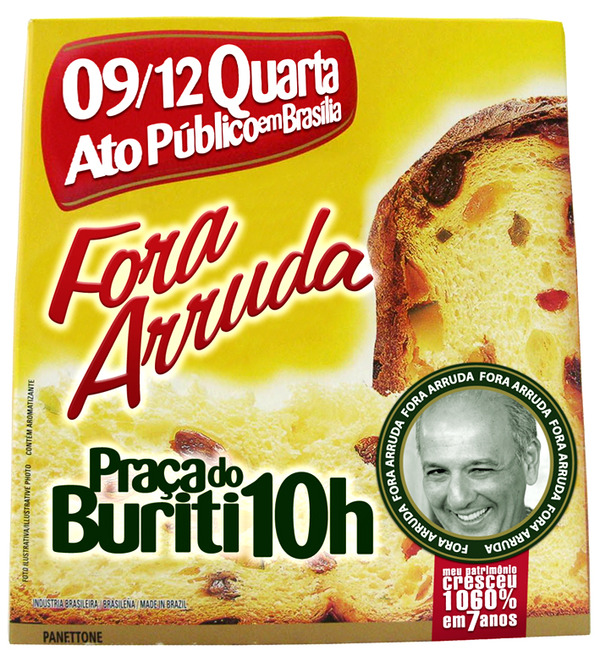
An invitation to the demonstrations inspired by Panettone-gate. Panettones have become the iconic image of the anti-corruption protests. Twitpic by Welder Rodrigues, twitter user @weldermm
Cesar Zyakannazio [pt] provides a summary of the latest scandal, also known as Panettone-gate, that erupted right as Governor Arruda was getting ready to crush his opponent Joaquim Roriz in the 2010 elections to the state government:
Aí apareceu o que começou como uma ’simples’ ação da PF; a “Caixa de Pandora” se abriu e a sexta-feira foi de fofocas, leaks e desmonte da imagem do governador, tão bem cuidada por rios de dinheiro em propaganda nos órgãos de imprensa locais. No final da sexta, o primeiro golpe: o inquérito inteiro, vazado primeiro na internet. E apareceu aquilo que defini “o escândalo de referência” – todas as modalidades de corrupção em um só inquérito. E o governador estava gravemente ferido, politicamente falando. E aí chegou o sábado. Quando parecia que o dia seria dedicado a regurgitar o imenso inquérito, aparece o batom na cueca, revelado primeiro no IG e depois repetido em todos os lugares. E, em dois dias, graças ao tempo real da internet, um governador que estava sólido se transformou num morto-vivo político.
Another video shows evangelist lawmakers with Durval Barbosa, after an alleged meeting in his office, praying and thanking God for having Barbosa with them, and thus money. The video has had more than 83,000 views in just one week, and became a YouTube hit. Several bloggers have published a transcript of the “Bribery Prayer”. Pastor Judiclay Silva [pt] comments:
As imagens do deputado distrital de seu partido, Rubens César Brunelli, recebendo dinheiro de um suposto esquema de propina deixaram o Brasil perplexo. Em outro vídeo, Brunelli aparece ao lado do presidente da Câmara Legislativa, Leonardo Prudente (DEM), orando pela vida de Durval Barbosa e pelo dinheiro entregue por ele. “Somos gratos pela vida do Durval, por ter sido instrumento de bênção para nossas vidas, para nossa cidade”, diz Brunelli. “Sabemos que somos falhos, somos imperfeitos, mas o seu sangue nos purifica”, diz o distrital. A oração dura cerca de dois minutos. Nela, Brunelli pede ainda “cobertura contra as investidas de homens malígnos contra a vida de Durval”.
As if these videos were not reason enough to keep Brazilians engrossed for the rest of the year, more videos and photos have appeared in conjunction with the case, showing wads of bribe money being received and stuffed into pockets and even socks and underwear. The blogger at IndicoEsse uploads some photos and makes a sarcastic comment:
Agora quem precisa apurar os fatos e ver se realmente se trata de propinas recebidas é a Polícia Federal. Não quero julgar. Se eu recebesse algum dinheiro grande, claro que só se não fosse dinheiro sujo, eu também esconderia. Nesse caso, é importante ver a origem de todo o dinheiro já que houve até uma oração para que Deus perdoasse eventuais falhas humanas.
André Dutra [pt] publishes numerous funny cartoons showing the “Great Brasília Panettone Line” and a list of all the politicians involved in the latest scandal, so that readers do not forget their names at the next election:
E a luta continua. Fora Arruda e toda a corja que se encontra no poder. 2010 é nosso!
Anticipating a possible impeachment, Governor Jose Roberto Arruda announced his disaffiliation from the Democrats at the end of the week, a day before a scheduled DEM meeting on his expulsion. Fábio Pannunzio [pt] suggests that he goes ahead, giving up the office for good:
Você só tem uma coisa positiva a fazer por todos nós, inclusive por você: Renunciar. Atalhar o sofrimento geral que está provocando. Deixe as pessoas corretas que vivem aqui buscar um outro caminho. Você não tem alternativa. Ou sai, ou saem com você.
“Arruda Out” activists are part of a growing student movement set to clean up the country from corruption, with around 30,000 protesters according to their website. The next protest is scheduled for December 16.

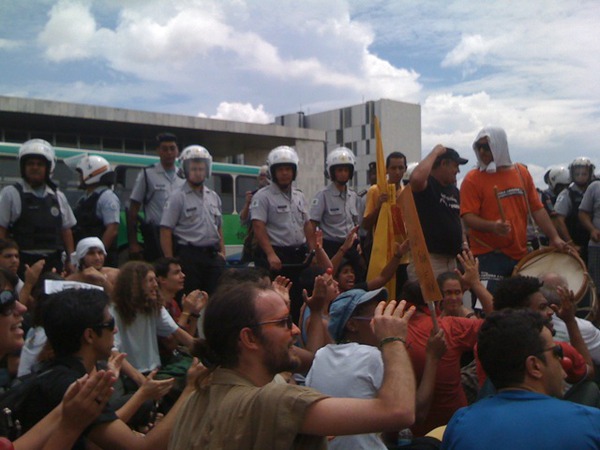
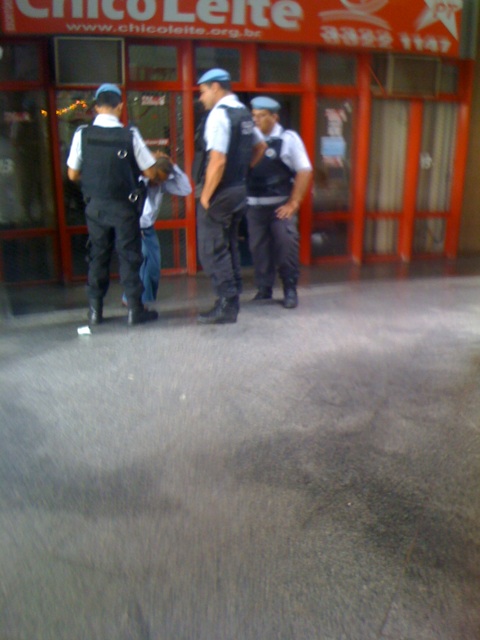
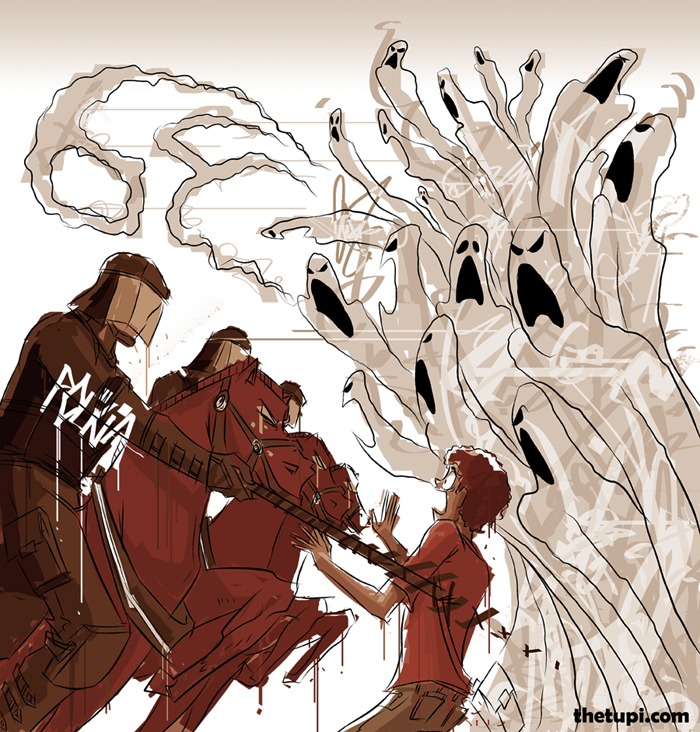
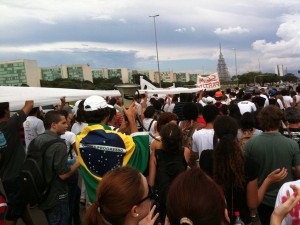







3 comments
So sad that atrocities like those still happen. And, even sadder it is that I can recollect scenes like those back in 2003, an not in the 1960s.
Again, students protested against the late and former Senator of the state of Bahia, Antonio Carlos Magalhaes.We wanted his impeachment. And the police of the state \welcomed\ us with tear gas, dogs and horses. As usual the censorship took place, and the local Tv did not release the images to their headquarters, so the national audience was barely aware of the facts.
In the end, our remarkable Senator resign so he would not lose his political rights to be re-elected some months later. What would be impossible if the impeachment happened; the politician is banned for the polls at least for 8 years.
So in Arruda’s case that the impeachment happen!